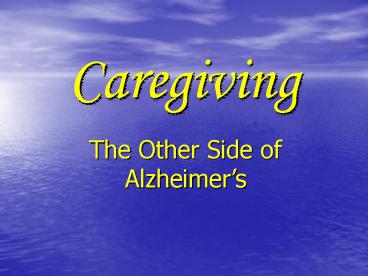Caregiving PowerPoint PPT Presentation
1 / 26
Title: Caregiving
1
Caregiving
The Other Side of Alzheimers
2
Caregiver
- The forgotten,
- hidden or
- second patient
3
You know too well the patient side of Alzheimers
- How much emphasis or acknowledgement, however,
have you allowed yourself as a caregiver???
- How is caregiving for an Alzheimer Patient
different than caregiving for someone with
Cancer, Heart Disease, Renal Failure, or Diabetes?
?
4
Alzheimers Disease is most often gradual and
progressive with each increasing stage taking
more of an emotional and physical toll on patient
and caregiver alike.
5
- Increased Deterioration
- Increased Dependency
6
Acceptance
- Acceptance does not come easy, often denying or
minimizing symptoms
7
Quickly, even in early stages, roles and
responsibilities change.
8
Change which brings a wide range of very natural
emotions in response to the disease
Confusion
Anger
Frustration
Overwhelmed
Embarrassment
Guilt
Fear
Sadness
Dont cheat yourself out of these very real
emotions.
Allow yourself to experience and work through
these emotions.
9
Primary mistake of caregiving
Endless reservoir of energy, spirit, knowledge,
skill, support, patience, and, yes, even love.
10
Caregivers are very susceptible and at high risk
for
11
Approximately 95 of all caregivers will
experience significant distress at various stages
of their caregiving experience.
12
Peaks Valleys of Reactions
Stress
Anxiety
Depression
13
Symptoms of Anxiety
- Excessive worry
- Preoccupation or fixation
- Shortness of breath or other physiological
responses
- Increased/Decreased Appetite
- Heightened Sensitivity
- Tearful
14
Symptoms of Stress
- Anger
- Denial
- Isolation/Withdrawal
- Exhaustion
- Irritability
- Sleep changes/sleeplessness/insomnia
15
Symptoms of Depression
- Feelings of hopelessness
- Sleep changes / excessive sleeping
- Lack of interest
- Loss of concentration
- Physical manifestations aches/pains
- Weight gain / loss
- Lack of energy
- Feeling of loneliness and abandonment
16
Five Reactions to Family Adjustment
17
Denial
- Description The initial response that nothing is
wrong. Denial can also reappear as false hopes
that treatment will cure the patient.
Help for the Caregiver Information about the
disease can help families understand what is
happening, and what to expect.
18
Over-involvement
- Description Attempts to compensate for the
illness and its impairments. By being
over-involved in the patients care, the
caregiver may refuse help and feel isolated.
Sometimes the primary caregiver will try to meet
every need of the patient.
Help for the Caregiver Families should be aware
of all of the available options for support,
including in-home support services. Caregivers
must understand that no one person can meet all
the patients needs. The consequences of
over-involvement can be detrimental to the
patient.
19
Anger
- Description Anger can occur when the family
realizes that attempts at compensation have
failed, and physical and emotional burdens begin
to take their toll. Long-standing and
interpersonal problems and unresolved issues can
be troubling at this stage if the root of the
anger is not addressed.
Help for the Caregiver Support groups can help
families work through feelings of anger and gain
empathy from other families. If anger becomes
severe, family members may need to be encouraged
to enter counseling so that hostility does not
stand in the way of patient care or sever
important family ties.
20
Guilt
- Description Developed from anger and what ifs
brought on by looking back. Unresolved feelings
of anger or guilt can lead to depression. Guilt
is often experienced when the patient can no
longer be cared for at home.
Help for the Caregiver These feelings are normal
responses to extreme stress. It is what
caregivers and family members do with their
feelings that really matters.
21
Acceptance
- Description Resolution or acceptance of the
problems. Acceptance comes from a full
understanding of the disease and its effects on
the family.
Help for the Caregiver Support, education, and
other resources can help families move toward
acceptance.
Excerpted from Caring for the Alzheimers
Patient Geriatric Mental Health Foundation
22
So How Do I Cope?
- Be gentle with yourself
- Be realistic with self and patient expectations
- Rest/Sleep/Eat to avoid health problems
- Make time for yourself
- without feeling guilty
23
So How Do I Cope?
Extravagant or Simple
A dedicated project with deadlines ora leisure
activity
How To???
- Think and plan to take care of yourself, asking
this question Take Care of Me Means???
- Book
Manuscript
Handwritten
Word Processed
Audio Taped
Video Taped
- Educate yourself about the disease and its
related impact
- A Diary
Music Memories
A Picture Album with Notes
A Cookbook
24
So How Do I Cope?
- Pursue Interventions
Respite
Counseling
Medication
Support Groups
Skills Training
Friends/Family Assistance
25
- Taking Care of Self Is
- NOT
- a Selfish Act
26
Handouts
- Reducing the stress in your life
- So how am I doing anyway?
- A Caregivers Bill of Rights

